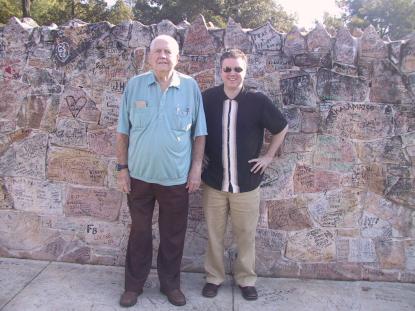Someone very important to me has died unexpectedly. Harris Mills was a veteran of two of the bloodiest battles of the Pacific during World War II, Guadalcanal and the under-reported battle for the tiny island of Peleliu. The reason I bring Sergeant Mills up in a public way, however, is not merely because he was important to me or because he was a witness to important and terrifying historical events, but rather because thinking back upon his epic life (which went right on being epic after the war) is stewing up thoughts about the importance of stories, something bigger even than the grief of an important passing.
Perhaps I'm overreaching, but I really don't think so: isn't story how people weave the fabric of shared identity and cultural memory? Harris Mills was, with his enormous voice and animated Memphis style, a natural storyteller. Sitting on his back porch by the hummingbird feeder, I heard him render stories large and small, from dodging Japanese bombers on Guadalcanal to winding up a German rocket scientist post-war who wanted to know how to cook a carp (Harris' intentionally longwinded description of the cooking method involved tacking the fish to a board, baking for one hour, then eating the board).
I'm reminded of the very fine short piece by Jorge Luis Borges called "The Witness," about the last Anglo-Saxon taking his memory of the old Saxon world with him. What is lost when we lose those firsthand stories? Every year we lose more people who witnessed World War II up close.
That's in part why I've been on a quest to save some of Harris' stories from oblivion, and thank God I succeeded in saving some of them. I've got a couple of hours' worth recorded, and some of it I've set to music, not for some by-now quixotic notion of musical fortune, but because it's powerful stuff that prompted response. So I'm happy to say you can experience some of this fine man's narrative power even now that he has left us. Here's my Myspace where you can hear him talk about sheltering from Japanese bombers ("Droppin' Bombs") and being surprised by a Japanese marine while hunting for post-battle souvenirs on Guadalcanal ("Coconut Grove").
The last time I saw him, we took this picture in front of Graceland. Harris Mills will certainly be missed.

The Witness
by Jorge Luis Borges
translated by Mildred Boyer
In a stable that stands almost within the shadow of the new stone church a gray-eyed, gray-bearded man, stretched out amid the odors of the animals, humbly seeks death as one seeks for sleep. The day, faithful to vast secret laws, little by little shifts and mingles the shadows in the humble nook. Outside are the plowed fields and a deep ditch clogged with dead leaves and an occasional wolf track in the black earth at the edge of the forest. The man sleeps and dreams, forgotten. The angelus awakens him. By now the sound of the bells is one of the habits of evening in the kingdoms of England. But this man, as a child, saw the face of Woden, the holy dread and exultation, the rude wooden idol weighed down with Roman coins and heavy vestments, the sacrifice of horses, dogs, and prisoners. Before dawn he will die, and in him will die, never to return, the last eye-witness of those pagan rites; the world will be a little poorer when this Saxon dies.
Events far-reaching enough to people all space, whose end is nonetheless tolled when one man dies, may cause us wonder. But something, or an infinite number of things, dies in every death, unless the universe is possessed of a memory, as the theosophists have supposed.
In the course of time there was a day that closed the last eyes to see Christ. The battle of Junin and the love of Helen each died with the death of some one man. What will die with me when I die, what pitiful or perishable form will the world lose? The voice of Macedonio Fernandez? The image of a roan horse on the vacant lot at Serrano and Charcas? A bar of sulphur in the drawer of a mahogany desk?


